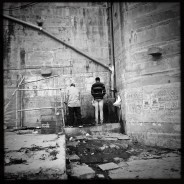
Uso de cookies
Este sitio web utiliza cookies para que usted tenga la mejor experiencia de usuario.
Si continúa navegando está dando su consentimiento para la aceptación de las mencionadas cookies y la aceptación de nuestra política de cookies.


3 January, 2016
“I missed this sweet Delhi smell”, says my friend Elena, undeterred. Her boyfriend, Victor, and I look at each other stunned because just as she finished that sentence, a sewer stench impregnates the air as the auto-rickshaw crosses a river of putrid water.
India has the infamy of hosting many of the most polluted cities in the world – according to the WHO, Delhi, its capital, takes the prize – and in daily news, the weather forecast includes a section which alerts you of the pollution levels in many of the country’s cities.
Since I’ve arrived in India, at times, there is a fog that surrounds me which I think will dissipate with the first sunlight. However, this fog is pollution and it stays with me throughout the day, making my motorcycles rides even more dangerous because of the lack of visibility.
Adding to the pollution issue, we need to also consider that walking through the streets of some cities it’s almost as if walking through a minefield, but of faeces from cows, dogs and other people. The WHO says that almost 600 million people in India have no access to toilets and attend to their needs in public roads or in clearings, adding olfactory pollution.
The Indian government, in its mission to reduce the practice or defecating or urinating in public places, started painting deity images on walls. Anyone willing to attend to Mother Nature’s calls in public will not have to think about it twice in front of the eyes of Shiva or Hanuman –two of the most veneered Gods of the Indian people. Also, India’s PM, has taken the challenge to clean India and promises to build around 120 million toilets by 2019, marking the 150th birthday of Mahatma Gandhi, for whom self-cleanliness was more important than independence.
Speaking about this with Elena, she tells me of a group or people in Mumbai called self-titled “The Clean Indian”, that roams the streets in a big yellow cistern truck with a water cannon aimed at those found urinating in public.
Fortunately, as I travel through with the bike, I also pass through areas where other, more pleasant, smells exist. For example: the markets, food stalls, spices, wet earth, the incense offered by the faithful to their Gods as an offering and the flowers in some homes.
Pollution is a worldwide problem, as shown in the recent Paris talks with 195 nations gathered to work out a solution to global warming. I fear, however, that the efforts will be useless unless we take conscience of the situation we’re in.
When I read that a country’s economy has improved because there is an increase in car sales, I ask myself whether that journalist is doing his job properly or is being paid by a car manufacturer’s marketing department. The more cars, the more the traffic jams, honking and stress.
Likewise, another issue at hand is the pollution created by the cars that, together with that of factories and the like, help form this massive brown cloud that you can see from the outskirts of big cities.
As I arrive to my destination, I take off my helmet and I see my reflection in the mirror. I feel more like a coal miner or a raccoon than a traveller. While taking a shower, crystal clear water falls on my head and turns black as it reaches my feet.
So, as in one way we advance technologically, environmentally we go backwards, slowly spiralling into a sweet death.